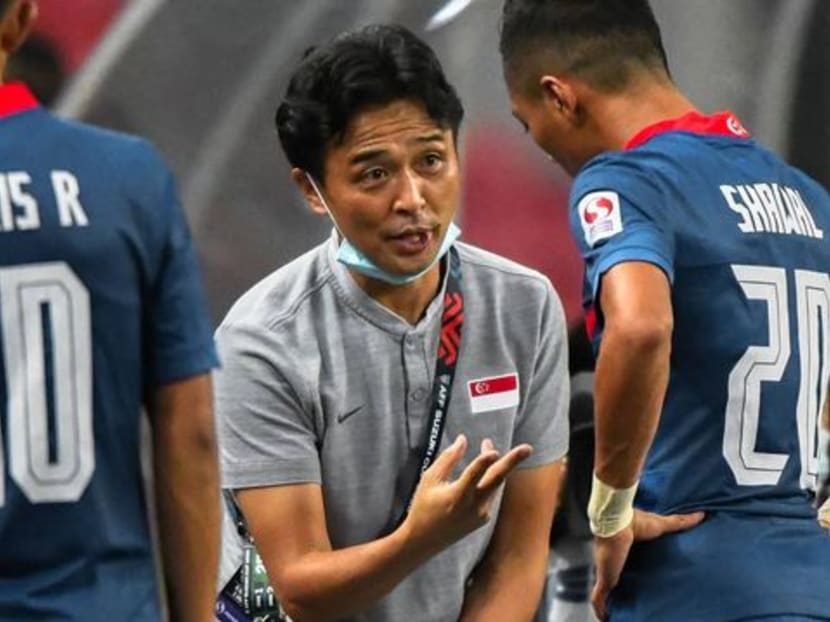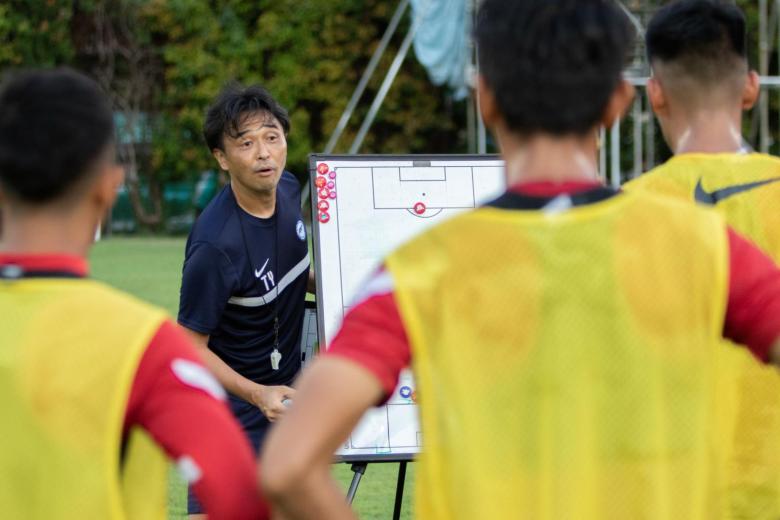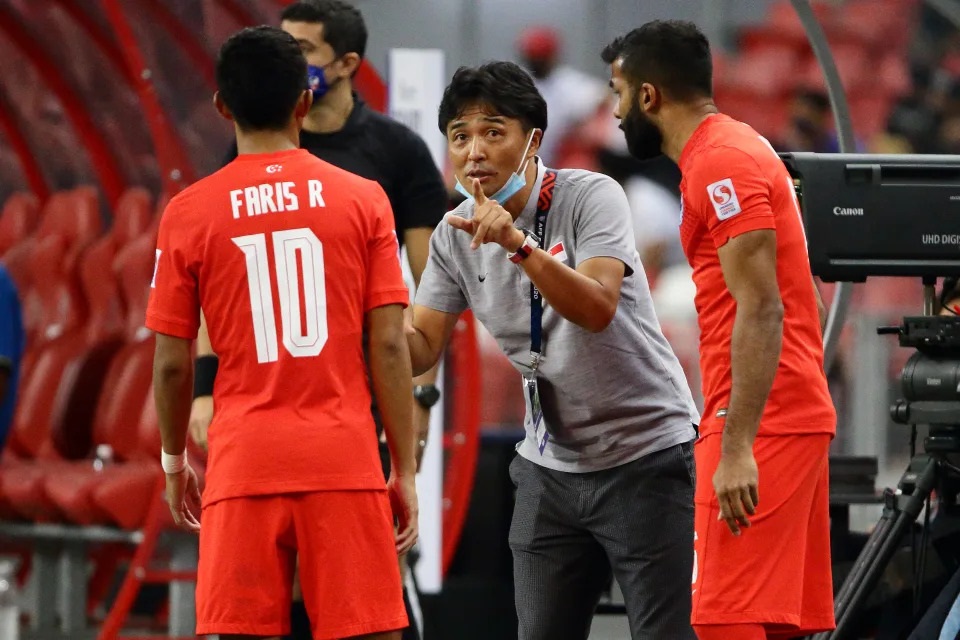I’m still shell-shocked as I write this controversial article on the shock exit of Japanese-born national football coach Tatsuma Yoshida, who, rather unexpectedly, threw in the towel after the Lions’ exit from the Suzuki Cup.
The 3-5 defeat against Indonesia in the two-leg semi-final was probably the final personal blow where he said final goodbyes to the FAS (Football Association of Singapore) after not delivering the Suzuki Cup – much taunted as Asean’s version of the World Cup!

Yoshida’s frustration was very plain to see in his numerous media interviews even though he still has a one-year contract, with the majority of his salary (including with two Japanese as assistants and even a translator) forked out by Japan, easily one of Asia’s football kingpins, with a discreet long-term understanding to fire up Singapore football.
As shared in the national newspaper, The Straits Times, he admitted to receiving offers from his home country as well as other countries in Asia (unnamed). But according to information from Japan, Yoshida is being contacted to return to work at Ventforet Kofu club in the Japanese Second Division. This is the club he previously joined in 2017.
He, rather strangely, also cited the need to be closer to his family – his wife and two daughters aged 11 and 14 – after being apart for most of the pandemic as a key reason behind his decision.
Pray tell me: What went wrong for Yoshida? Did he get his football chemistry and strategy in proper order with the Lions? Looking back, Yoshida’s contract was only renewed in February 2021, after signing for the first time in 2019. He led the Lions by 20 games with a record of six wins, four draws and 10 losses.
I remember Yoshida wasted little time in 2019 in stressing that teamwork within the Football Association of Singapore (FAS) will be crucial to leading the Lions to success. Then at 44, he is the first Japanese as well as the youngest coach in this millennium to lead the Lions. He has been appointed on a two-year deal and replaces V. Sundram Moorthy, who was the last permanent Singapore coach before he vacated the post in April 2018.
TEAMWORK MUST BE RIGHT
He said: “Teamwork is crucial in order for us to succeed which is why I am pleased to have local legends like (national Under-22 coach) Fandi and Nazri on board this journey. The synergy in my partnership with Fandi will be of utmost importance as the Under-22 team is critical to the long-term objectives of the national team.”
Sad, if not cruel, that coaches depend on authentic results to survive, sometimes even at the mercy of the players, too, who may pass the ball the other way around. Yes, I know it is a pity that the Lions was eliminated in the semi-finals because they performed quite well in the two games against Indonesia.
In particular, in the semi-final second leg, despite being kicked out by three players, the Lions still fought solidly. They still had a chance to end Indonesia, but Faris Ramli missed the penalty in the final minutes (when the score was 2-2).
As a former AFC referee-instructor, I sympathise with Yoshida as refereeing decisions were controversially wrong with a series of unfavourable decisions. But when the last-gasp penalty came, I thought it’s the first ray of God-sent sunshine in what has otherwise been a very gloomy year for Singapore football.
Now, where did we go wrong? Putting the carts before the horse? After securing the services of Belgium’s world-class tactician Michel Sablon as the new technical director almost spread cheer in the football fraternity. But as I understand, there were wet-behind-the-ears FAS Councils who even threw stones at him during FAS Council meetings.
Mind you, Sablon was not of street-beggar quality and distinguishedly on the coaching staff of Belgium’s senior sides at the 1986, 1990 and 1994 World Cup Finals. He was the director of the Euro 2000 Finals and, perhaps most crucially for Singapore football, he was the technical director of the Belgian FA from 2001 to 2010, where he designed a 10-year master-plan that would revolutionise the sport in the country of 11 million inhabitants.
“His resume and track record looks very, very good, he’s exactly the kind of guy you’d want to bring in here,” said former Singapore international turned television pundit John Wilkinson.
WASHING DIRTY LINEN
In my opinion, and I stand corrected even after covering sports matters for the major newspapers for more than three decades, the washing of dirty linen, within the walls of FAS headquarters at Jalan Besar Stadium and even the dressing-rooms, must immediately stop and legal-trained Lim Kia Tong (FAS President) and company must accept ownership of this continuing ridiculous no-result saga and throw in the towel.
Sablon is gone. Yoshida has been shown the door. Now, what remains to even lift the Lions, whose longer-term glory is to qualify for the World Cup 2034. Thirteen years from now, perhaps even 30 years, will not be enough to get the basics right and build the correct foundations to fire up what once appeared to be Singapore’s favourite sport, which blind-foldedly drew 50,000 folks to the National Stadium and sensationalised the rip-roaring “Kallang Roar”.
Yoshida appeared to be like the proverbial “Pied Piper” three years ago as his experience with youth development appeared to be a key factor and the FAS were confident he’d be able to bring about the high intensity, fast-moving style for the Lions for regional glory.
For those unfamiliar, he was born in Chiba prefecture, and as a central midfielder. He started his playing career with hometown club Kashiwa Reysol before turning out for Kyoto Sanga and Montedio Yamagata. In 2002, he signed for Jurong FC and played under Sundramoorthy, then player-coach for the Cobras (Jurong’s nickname).
After hanging up his boots that year, Yoshida returned to Reysol, where he rose through the ranks from youth-team coach to technical director and then the head coach. While at Reysol, he helped to produce some national players like Marseille right-back Hiroki Sakai.
However, he then lasted just one season each as head coach of Reysol (2015) and Albirex Niigata (2016). His last head coach assignment was at Ventforet Kofu from 2017 to last year, and, to be objective, he has no previous experience helming a national team.
DOOMSDAY ON THE CARDS?
There were football commentators like Michael Ang who predicted that “doomsday Is approaching” and even questioned if Singapore has become a dumping ground for third-rate footballing talents. Simply because Yoshida has shown that he’s incapable of winning J-League matches 72.7% of the time and unable to win even J2 league games 81.8% of the time. His last match as coach of J2 club Ventforet Kofu (VK) was in April last year. He led Ventforet Kofu to relegation from J1 in 2017.
Pray tell me: Did the FAS really do their coaching homework right? Nothing has gone right for the FAS. Yoshida’s latest departure comes less than two months after another top post in FAS became vacant, with technical director Joseph Palatsides quitting abruptly just five months after signing a contract extension until 2023. And coaches I spoke to feel a strong sense of dismay for Yoshida as he appeared to have done all he can during a difficult period.
Touch your heart and ask, where are the FAS now headed? One step forward and five steps back? There is too much chopping and changing, in my opinion, and if there is going to change at the head coach or technical director level, it does not bode well.
I seriously heard of discreet players’ disunity in the dressing-room and even in the field of play, with a few self-appointed “ring leaders” who wanted to undermine the Japanese coach because he was pushing them, from a fitness point of view, way beyond their limits.
TEAMWORK-BASED MOVE
Several coaches commended Yoshida for engaging with SPL coaches during his tenure. The Japanese had even invited several local coaches to observe his training sessions in order to create an element of longer-term teamwork-based continuity.

Where will the FAS go from here? Yes, the search for Yoshida’s replacement will go on soonest time and the priority is for the next coach to share the same playing philosophies as Yoshida. But after Sablon and Yoshida, where are we headed? I doubt even Jose Mourinho or Gus Hiddink will take up the offer if offered more than a million dollars as what our Cabinet ministers are drawing.
The Lions are frustrated and one wonders if the FAS Council members feel the same disgust as Singapore desperately begins the search for a replacement next month, ahead of June’s qualifying rounds for the 2023 Asian Cup.
In my opinion, the future coach must be more than a role model, and able to confidently communicate with the team. Tactics and strategies have changed, especially the past decade and he must not only teach them more than football basic skills, but also social skills like discipline, patience, determination, and teamwork. Always put as one of your goals the serious development of the team players.
Please bring the right assistants with you. I understand Yoshida had a team of 20, including a Singaporean sports scientist! As award-winning coach Jita Singh of Malaysia Cup fame unfailingly tells me, historically in football, there has been one central figure in the organisation whose presence dominates everything and whose judgments people identify with.
Like what he did in the 1980s, that one person may well be the dictator, and everyone else simply does whatever he says. In a lot of ways, the old system was much easier for all involved. The dictator gave orders and everyone else just followed them.
Now working successfully with the people in the organisation demands more from the coach or the executive.
TOTAL COMMITMENT
In my opinion, as an AFC qualified coach, in coaching, I think of it as the coach’s ability to condition the players’ minds and to train them to think as a unit, while at the same time, making sure each player approaches his own game with total concentration, intensity, and skill. There should never be a moment on the football field when a player doesn’t feel challenged both physically and intellectually. That is why the old bludgeon approach is leaving football the same way it is leaving the business.
Pray tell me: What is replacing the old approach like Jita Singh? Management today recognises that to have a winning organisation, it has to be more knowledgeable and competent in dealing with and developing young talented people. That is the most fundamental change.
The real task is to bring together groups of people to accomplish something. In the old days, the approach was rather crude. The organisation would simply discard a player who did not fit a specific, predefined mould. If a player did not conform to the way management wanted him to behave, or if he made the organisation uncomfortable, it got rid of him. That was the typical response.
Today, in football as elsewhere, individualism is the general rule. Some of the most talented are the ones who are the most independent. That has required from management a fundamental change in the art and skill of communication and in organisational development.
Most important, as I closely followed the Lions, especially during this Suzuki Cup, there has been much more recognition and acknowledgement of the uniqueness of each individual and the need that people have for some degree of security.
Now pray tell me again: How does that translate into potential winning teams?
SENSE OF BELONGING
Those teams that have been most successful are the ones that have demonstrated the greatest commitment to their football folks. They are the ones that have created the greatest sense of belonging. And they are the ones that have done the most in-house to develop their team. That commitment has come through in the personality of the organisations, which the FAS, rather sadly, failed to do for more than two decades.
Now pray advise me: What is the biggest obstacle to creating this kind of organisation?
The coach must account for his ego. He has to drop or sidestep the ego barrier so that the players can communicate without fear. They have to be comfortable that they will not be ridiculed if they turn out to be mistaken or if their ideas are not directly in line with their superior’s. That is where the breakthrough comes. That is, in my opinion, what it takes to build a successful, winning organisation.
I also agree that English is a marvellous language until it comes to the word “ego.” We may throw that around, using that one word to cover a broad spectrum of meanings: self-confidence, self-assurance, and assertiveness – attributes that most people think of as positive. But there is another side that can wreck a team or an organisation.
That is being distracted by your own importance as Yoshida may have thought. It can come from your insecurity in working with others. It can be the need to draw attention to yourself in the public arena. It can be a feeling that others are a threat to your own territory. These are all negative manifestations of ego, and if you are not alert to them, you get diverted and your work becomes diffused.
Ego, in my humble opinion, in these cases makes people insensitive to how they work with others and ends up interfering with the real goal of any group efforts. If you ask me, I give a direct no-punches-pulled answer: What do you think are the essential management skills of a successful head coach?
ROLE OF COACH
The role of the head coach begins with setting a standard of competence. You have to exhibit a strong working knowledge of the game. The head coach must be able to function effectively and decisively in the most stressful situations. And the head coach must demonstrate resourcefulness – in particular, he is responsible for designing a system of football that is not simplistic. His system should never reduce the game to the point where he can blame his players for success or failure simply because they did not physically overwhelm the opponents.

I strongly believe that successful coaches realise that winning teams are not run by single individuals who dominate the scene and reduce the rest of the group to marionettes. Winning teams are more like open forums in which everyone participates in the decision-making process, coaches and players alike until the decision is made.
The key to being a modern football player is the ability to respond quicker, both mentally and physically, than the other player. Some people are naturally quicker physically. But to win, you need to be quicker as a team. You must beat your opponent to the punch every time.
The Lions, sad to say, didn’t have it. Physical strength and speed are important advantages, but even more advantageous is having the training that permits you to respond intelligently to whatever confronts you. That means more precision, better execution, and quicker response than your opponents. Under the extreme stress of game conditions, a player must condense his intellect and focus it on thinking more quickly and clearly than the opposition.
We can post-mortem until the cows come home, but to the FAS, my message is clear: Think fast and how do you know what it takes to bring out the best in a young player’s abilities? Unfortunately, there is nothing exact about it.
Just get your basic grassroots football principles. Get to the early childhood education and teach the little lads the right footballing values. It may take a decade or more, seriously. But it’s worth it in a country where football popularity appears to have been overwhelmed by false results and when the immediate neighbours have started sprinting and literally trampling all over the shop.
The Lions’ most disappointing exit from the Suzuki Cup is a classic timely point and the right time for the FAS to shape up or ship out.
* This award-winning journalist-writer ranks as Singapore’s only qualified AFC-licenced coach and a AFC referee-instructor with local and international football connections that go more than four decades.

